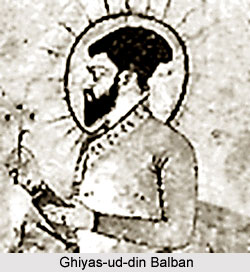 Ghiyas-ud-din Balban was initially the prime minister under the rule of Nasir-ud-din Mahmud, eighth ruler of Slave dynasty from 1246-1266. Although Ghiyas-ud-din Balban was born to a wealthy family of Turk Ilbari tribe yet life was not that much easy going for Balban. When he was a child the Mongol captured him and sold in Bagdad. He was brought to Delhi and Iltutmish purchased him. His potentials brought him to the good books of the Sultan. He was promoted as the `Chalgan` or `chihalgani`, the group of most important and powerful forty nobles of the court. During the time of Nasir-ud-din Mahmud he became most powerful amongst the Chalgans as the Sultan used to spend most of his time in prayers. After Nasir-ud-din died in 1266, Balban declared himself as the Sultan of Delhi. He laid down the foundation of Balbani dynasty.
Ghiyas-ud-din Balban was initially the prime minister under the rule of Nasir-ud-din Mahmud, eighth ruler of Slave dynasty from 1246-1266. Although Ghiyas-ud-din Balban was born to a wealthy family of Turk Ilbari tribe yet life was not that much easy going for Balban. When he was a child the Mongol captured him and sold in Bagdad. He was brought to Delhi and Iltutmish purchased him. His potentials brought him to the good books of the Sultan. He was promoted as the `Chalgan` or `chihalgani`, the group of most important and powerful forty nobles of the court. During the time of Nasir-ud-din Mahmud he became most powerful amongst the Chalgans as the Sultan used to spend most of his time in prayers. After Nasir-ud-din died in 1266, Balban declared himself as the Sultan of Delhi. He laid down the foundation of Balbani dynasty.
Balban was a shrewd and practical statesman. There were many difficulties he had to face when he became the Sultan. He decided that he would not adopt an aggressive policy of conquest till he was able to restore peace and order within the existing territory of his kingdom and bring it under his effective control. The reign of Balban is not that of the extension of the empire but that of consolidation of the territories of the Delhi Sultanate. He took immediate measures to provide security to the city of Delhi. His measures succeeded and peace was restored. Balban also constructed roads, cleared the jungles and took measures to ensure the safety of the travellers. Within a few years of his accession to the throne, Balban not only succeeded in suppressing revolts but also bringing about peace and security to his subjects.
Ghiyas-ud-din Balban considered himself as the deputy of God on earth. His court was organised on the patterns of Irani Kings. He framed set rules for court behaviour and enforced them strictly. Nobody could even dare to smile during the court. The court dress was fixed up for the nobles and drinking of wine was prohibited for them. Balban gave shelter to all foreign scholars and nobles and named their residences in the name of their country or family because of which he was regarded as the protector of Muslim culture. He established the intelligence department. His spies were spread throughout the country to gather information about all political development and conspiracies against him. In order to protect the Empire from the Mongols, Balban built new forts and repaired the old ones between the Indus River and Delhi.
Prince Muhammad was the favourite son of Balban. He died during the war against the Mongols. That was the greatest setback for Ghiyas-ud-din Balban. He realised that his centralised monarchy would dissolve without his son Prince Muhammad. He never recovered from this realisation and died in 1287 with a broken heart. As his successors were incompetent, Jalal-ud-din Khilji captured the throne in 1290.



















